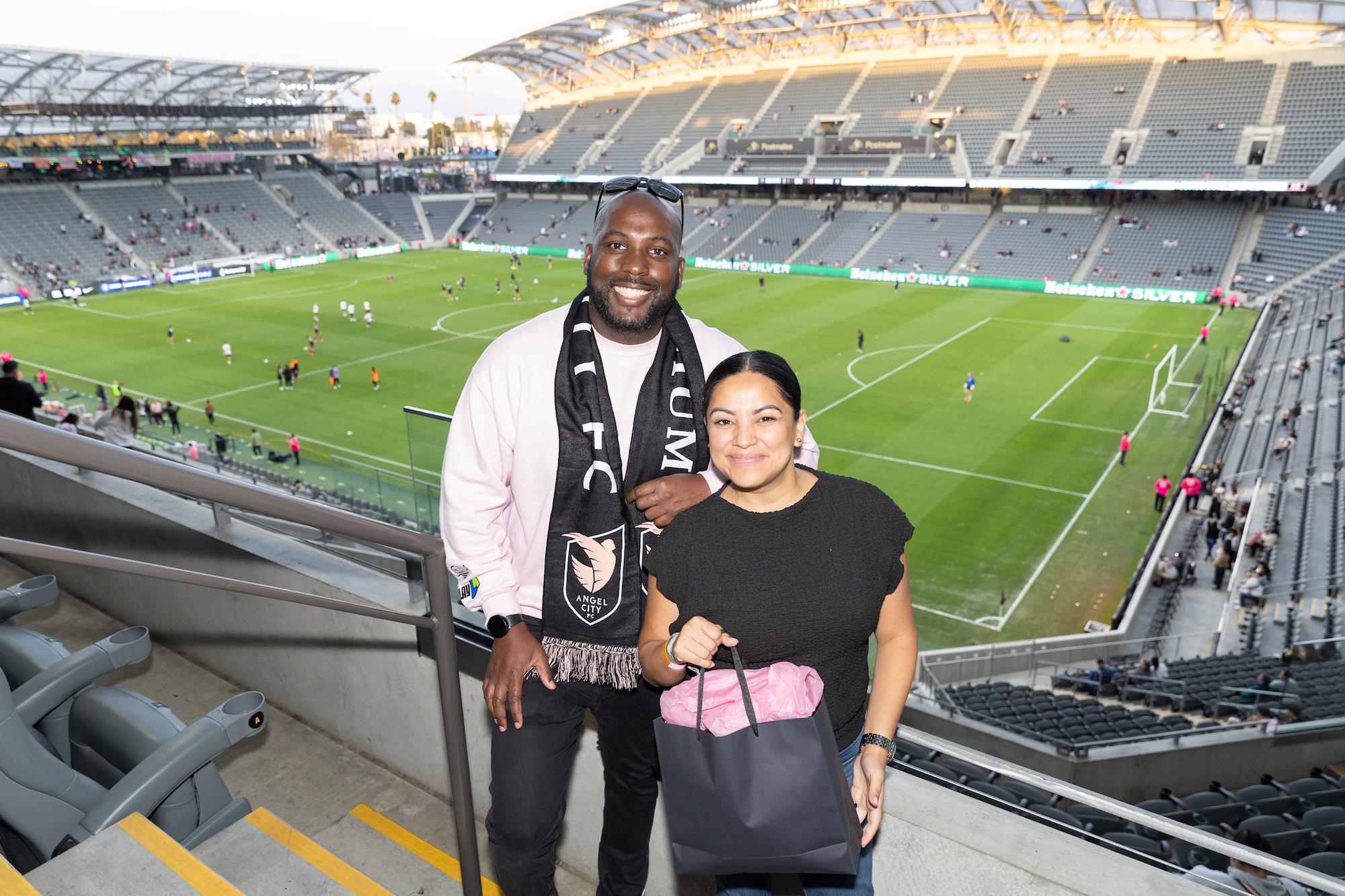
Austin Dumas and City of Los Angeles Department of Recreation and Parks Chief Innovation Officer Veronica Polanco at an Angel City game
Growing up, Austin Dumas got a firsthand look at the disparities girls in sports face compared with their male counterparts. “Growing up in the 80s, my older sister was a really great athlete,” says Dumas. “We played on a basketball team together. She was the only girl that played in the league, and she really had a hard time. Girls didn't really play sports.”
Seeing his sister’s struggles as a female athlete is what Dumas, Chief Operations Officer for PLAYLA at the City of Los Angeles Department of Recreation and Parks, now says is his “why.”
In addition to his sister’s difficulties, though, Dumas also saw how his parents’ encouragement kept her going. “Particularly my dad, he really encouraged my sister: if this is what you want to do, if this is what you're passionate about, do it,” he says. “I think this is why gender equity and GPLA means so much to me, because I've seen the impact of parents supporting their daughters firsthand.”
GPLA is a Rec and Parks program that provides opportunities for girls to play sports for free Since 2022, Angel City has collaborated with GPLA in growing the program to support over 300 participants across 6 locations. In a sport where high costs often prevent underprivileged kids from playing, it’s a vital step in the right direction—something Dumas is keenly aware of.
“They call soccer the world's game, right?” he says. “But when you play club, you're talking about thousands of dollars to play, plus travel expenses, and so it's just out of reach for a lot of kids in lower-income areas, even if they’re as good or better than the kids who can afford it. It shouldn't be that way.”
The high cost of club soccer hits girls especially hard. “If you have multiple kids,” says Dumas, “parents sometimes are choosing which kid gets to play sports—and usually, because of traditional gender roles, it's the son.”
GPLA levels that uneven playing field. “To be able to provide access to the sport, pretty much free,” he continues, “is amazing. It's so rewarding to see parents not having to think about cost as a barrier.”
Dumas, who has been with Rec and Parks for 23 years, says he initially got into his chosen field because of his love of sports. His first part-time job was with the Boys and Girls Club in his hometown, Las Vegas. When he moved to LA, he started working as a park director. “It’s just a fun job,” he says. “You get paid to play!”
He started at Venice Beach, but soon found his way to South LA, where he spent most of his career as a park director. “I worked in Watts, in the Jordan Downs housing projects, and other parts of South LA,” he says.
In the process, Dumas has found that his work is about a lot more than just sports. “I love being a mentor to people that look like me,” he says. “It's just been really a blessing to serve and work with the community.”
Dumas is now the COO for PlayLA, the parks department’s adaptive youth sports program, as well as supervising the department’s gender equity initiatives, among other programs. The inception of the Angel City/GPLA collaboration was when Dumas was working as the principal supervisor for the Expo Center. Angel City’s senior manager of community impact, Erika Sanchez, reached out wanting to start a robotics program with the park’s teen club.
“From there, I said, ‘hey, I oversee the section called GPLA. We'd love to collaborate with you and do some things related to soccer and girls,’” he says. “And that's how we got started.”
The program is centered around soccer, but there’s also an educational and leadership component—the vast majority of youth athletes, after all, go on to have careers outside of their sport. “The core components are financial literacy, mental health, healthy eating, those types of things,” says Dumas. “We also have panels with people like BMO executives and city employees, so they're able to see what opportunities are out there.” (BMO supports the program through Angel City’s 10% model.)
In addition to his actual work, where he’s helped give thousands of kids the chance to play sports, Dumas says he’s proud to have had several of the young people he’s worked with follow in his footsteps and begin careers with the parks department. “Seeing these communities I've worked in, seeing gang violence and the traumatic stuff that kids go through firsthand at the parks,” he says, “I know I was an influence in their lives. I showed them a career path, and they’re making a livelihood and able to start a family and live in LA.”
Dumas grew up playing American football and was first exposed to soccer in college, where he made friends with some international students. “I didn’t understand soccer, and they didn’t understand football,” he laughs.
Through this collaboration, though, he’s become an Angel City fan.
“The excitement of it is great—going to the game and feeling the atmosphere, the passion,” he says. He especially enjoys bringing his five-year-old daughter to games. “The atmosphere of a soccer match is like nothing else.”

